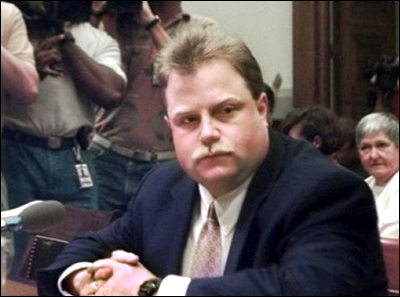
J Robert Smith
- Nov. 25, 2019
- 5 min read
“This is essential because the underlying theme of the [Clint Eastwood movie about Richard Jewell] is that the FBI and press are not to be trusted. Yet the way the press is portrayed often differs from reality,” Riley said in the letter to TheWrap on Monday.
— Atlanta Journal Constitution editor-in-chief Kevin G. Riley, via TheWrap, November 18, 2019
[R]ecently the American Journalism Review sharply criticized The A.J. C. for the scanty confirmation and lack of skepticism in its coverage of Jewell.
— “American Nightmare: The Ballard of Richard Jewell,” Vanity Affair, February 1997
THE TAKE
Richard Jewell, the new Clint Eastwood film about the Atlanta Olympics security guard, comes to theaters this December 13. It’s about rushes to judgment. It’s about prejudices and suppositions leading to false accusations by reporters and editors. It’s about the FBI, which mishandled the case, running roughshod over Jewell’s rights.
Jewell, an innocent man, was nearly railroaded, accused and convicted in the media for the 1996 Atlanta Olympics bombing. But facts – the reality – were very different. Jewell actually saved lives. He was a hero.
Despite what the current editor-in-chief, Kevin G. Riley, of the Atlanta Journal Constitution claims, facts prove otherwise. The then AJC managing editor, John Walter, in a rush to scoop the competition, ran with assumptions about Jewell that led to a false conclusion: He fit the profile of a lone bomber. There was no adversarial journalism coming from the AJC. The newspaper sparked a media feeding frenzy.
From the Vanity Fair exposition on the Jewell case:
When I asked John Walter about the lone-bomber sentence, he said, “I ultimately edited it. . . . One of the tests we put to the material is, is it a verifiable fact?” One editor added, “The whole story is voice-of-God. . . . Because we see this event taking place, the need to attribute it to sources—F.B.I. or law enforcement—is less than if there is no public acknowledgment.” John Walter indicated that he had not seen a lone-bomber profile. I asked him, “Whose profile of a lone bomber does Richard Jewell fit? Where is the ‘says who’ in this sentence?” Walter said that he felt comfortable with the assertion. [Italics added]
But the mainstream media’s reliance on guesswork, shoddy assumptions, and bias that led them to draw wrong conclusions originated with the FBI.
Again, from the Vanity Fair investigative report:
Several states away, Colonel Robert Ressler was watching CNN when the A.J.C. extra edition was shown. Ressler, who was retired from the behavioral-science unit of the F.B.I., had, along with John Douglas, developed the concept of criminal-personality profiling. He was the co-author of the Crime Classification Manual, which is used by the F.B.I. He had interviewed Ted Bundy, Jeffrey Dahmer, and John Wayne Gacy, and as he watched the TV report, he was mystified. “They were talking about an F.B.I. profile of a hero bomber, and I thought, What F.B.I. profile? It rather surprised me.” [Italics added and Snip]
Then this passage from Vanity Fair:
[Snip] “There is no such classification as the hero bomber,” he told me recently. “This was a myth.” Later he said, “It occurred to me that there was no database of any bomber who lived with his mother, was a security guard and unmarried. How many hero bombers had we ever encountered? Only one that I know of, in Los Angeles, and his bomb did not go off.” Ressler knew that something was off; profiles are developed from a complex set of evidence and facts derived only in part from a crime scene. The bomb had been deadly, which was not consistent with the “hero complex.” Furthermore, he wondered, where did they get the information to put the profile together that fast? He asked himself, What came first here, the chicken or the egg? Was the so-called profile actually developed from the circumstances, or was it invented for Richard Jewell? [Italics added]
Jewell was a 34-year-old single man living with his mother. He had spent much of his working life as a security guard and sheriff’s deputy. He was white and owned guns. He was pegged a loner, though he wasn’t. He had remarked prior to the bombing that he thought something “big” would happen at the games, which, with along with similar remarks, caused the FBI to decide that Jewell was suspicious. It was prejudices, not solid police work and good journalism, that led to branding Jewell the suspect in the bombing.
As a result, through the entirety of the investigation – about 90 days – Jewell and his mother, Bobi, were subject to public scorn, abuse, and humiliation. He and his mother were hounded. It was, based on accounts, a 3-month living hell for the Jewells.
Smart lawyering and a relentless media campaign by Jewell’s attorneys effectively countered the FBI’s and mainstream media’s assaults.
Returning to the Vanity Fair report:
At the U.S. Attorney’s Office, it had become increasingly clear to Kent Alexander that something had to be done about Richard Jewell. Janet Reno had seen Bobi Jewell on TV and was moved by her sincerity. Privately, Reno and Deputy Attorney General Jamie Gorelick were said to be concerned about the heavy-handed tactics of the F.B.I. “The case had become a total embarrassment,” a Justice Department official told me, but Alexander was in a complicated situation. He was working closely with the F.B.I., and there was no sign that the bureau was ready to let go, despite growing consternation among the local agents that the Washington command center had mishandled the case. [Italics added]
Richard Jewell was finally exonerated. His ordeal should be a cautionary tale to citizens, though. Innocent people can be and are falsely accused. The FBI didn’t follow best practices. It fell prey to bias and rushes to judgment. When what law enforcement gets wrong is amplified and spread by the mainstream media – and social media in today’s world – the damage to reputations and lives can be lasting.
From London’s The Guardian, October 26, 2007:
Of course, the FBI had no evidence against him, nor did his voice match the emergency call made by the supposed bomber. They attempted a clumsy sting where, under the guise of participating in a training video, they tried to lure Jewell into incriminating statements. Three months later, they gave up the charade and he was publicly cleared, a fact reported with far less fanfare by the media that had trumpeted his guilt. Jewell later likened himself to a bleeding cow being set upon by piranhas.
In 1998, the FBI identified a new suspect, a born-again Christian named Eric Rudolph. Finally captured in 2003, he confessed to bombing abortion clinics and a gay nightclub, as well as Centennial park. He is now serving a life sentence.
Richard Jewell died from complications of diabetes in 2007. He had recovered a normal life. But as Jewell told Vanity Fair reporter Marie Brenner for the 1997 exposition:
You don’t get back what you were originally,” he told me. “I don’t think I will ever get that back. The first three days, I was supposedly their hero—the person who saves lives. They don’t refer to me that way anymore. Now I am the Olympic Park bombing suspect. That’s the guy they thought did it. “
What do you think? Weigh in!
